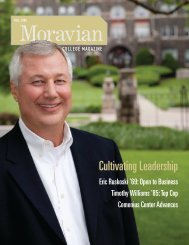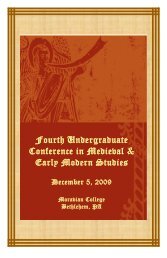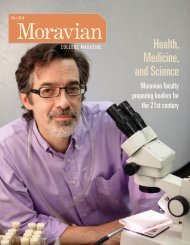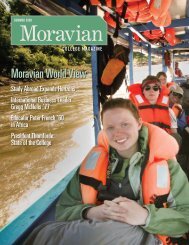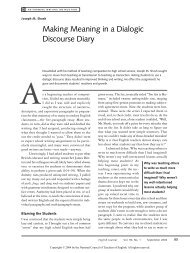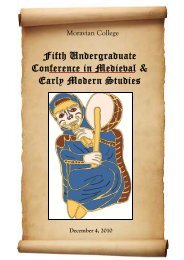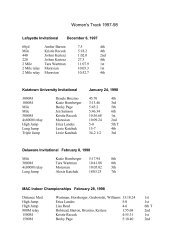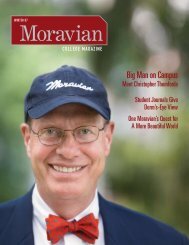Family Farms - Moravian College
Family Farms - Moravian College
Family Farms - Moravian College
Create successful ePaper yourself
Turn your PDF publications into a flip-book with our unique Google optimized e-Paper software.
Glenn Jurek ´64 checks the rice crop on his Texas<br />
farm.<br />
Glenn F. Jurek, M.Div. ’64<br />
He planned to save souls,<br />
not sow seeds. After graduat-<br />
ing from the University of Texas<br />
with a major in history and a<br />
minor in sociology, Glenn Jurek<br />
’64 ventured northward to attend<br />
<strong>Moravian</strong> Theological Seminary,<br />
and then worked as a <strong>Moravian</strong><br />
pastor from 1964 to 1969. Eco-<br />
nomic realities, though, moti-<br />
vated him to seek other options.<br />
“Even though I enjoyed my work,<br />
I had to leave the pastorate,”<br />
Glenn says. “I needed more money<br />
to live on, and to send my two<br />
children to school.”<br />
So in 1969, Glenn went to<br />
work as a farmhand for his uncle<br />
in Texas, near the Gulf of Mexico.<br />
It was hard work. “Sometimes<br />
we worked five and a half days<br />
a week,” he says. “And when we<br />
were planting or harvesting<br />
we worked every day.” But as<br />
demanding as the work schedule<br />
was, Glenn was hooked on the farming life,<br />
and a few years later he wanted to farm on<br />
his own. “I got the financing and bought my<br />
own farm in 1973. At first I sharecropped,”<br />
Glenn says. “My portion was 250 acres of<br />
rice. I chose rice because I wanted to grow<br />
healthy food, and rice is one of the best<br />
things we can eat.”<br />
The <strong>Farms</strong>, They Are A-Changin’<br />
Farming may be an ancient profession, but it's one<br />
that keeps pace with the times. “Technology has<br />
moved the industry forward,” says Kathryn Heil ’87,<br />
county executive director of the USDA’s Lancaster<br />
County Farm Service Agency in Lancaster, Pa.<br />
“Progressive farms embrace that new technology,<br />
which includes global-positioning systems in tractors<br />
and harvesters,” she says. “Among other things, GPS<br />
allows farmers to check which areas of their fields<br />
yield more crops and which areas could use more<br />
nutrients. The technology also helps them use less<br />
fertilizer."<br />
Not everything new comes from a satellite:<br />
“Some farmers use computer software, including<br />
CourTesy oF glenn JureK ´64<br />
computer-aided design programs, to help plan fields<br />
and manage crop production,” says Kathy. “And<br />
dairy farmers can use microchips to track milk pro-<br />
duction.” Many small family farms just can’t afford<br />
the latest and greatest in technology, though. One<br />
option for small farms is to work with a custom farm-<br />
er. “If you’re a farmer without high-tech equipment,<br />
you can hire someone who’s invested in the technol-<br />
ogy to help you,” Kathy explains. “You may ask him to<br />
plant or harvest your crop for you, because you don’t<br />
have that equipment." Everyone wins: small farmers<br />
get their crops planted, and custom farmers make a<br />
return on the expense of their equipment instead of<br />
letting it sit idle.<br />
Glenn ran his farm alone for a few<br />
years, but the work became too much for<br />
one person. “I hired a couple of young men<br />
to work with me,” he says. “Those same men<br />
were with me in 1990 when I retired.” Dur-<br />
ing harvest season, Glenn had as many as<br />
10 or 12 men working for him, for 12 or 14<br />
hours a day. Yet, like the other farmers in<br />
this story, he says the sweat equity brings<br />
intangible dividends “I just loved working<br />
with the soil and growing crops,” he says. By<br />
the time he retired in 1990, Glenn’s one-man<br />
operation had grown to include high-tech<br />
farm equipment, more than 3,000 acres of<br />
land, and productive relationship with rice<br />
marketer Uncle Ben’s. “One year, they bought<br />
my entire rice crop. All that brown rice went<br />
to Belgium and was shipped throughout<br />
Europe.” Looking back, Glenn sees similari-<br />
ties between his work on the farm and in the<br />
pastorate. “In either career, you’re feeding<br />
people—their stomachs or their souls.” W<br />
Linda Rao has written about health and fitness for many<br />
national magazines. If you were at <strong>Moravian</strong> between<br />
1987 and 1988, you may remember her as assistant dean<br />
of students.<br />
FALL 2007 MORAVIAN COLLEGE MAGAZINE 17<br />
phoTo By John Kish iV



